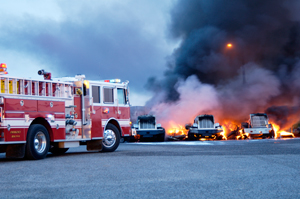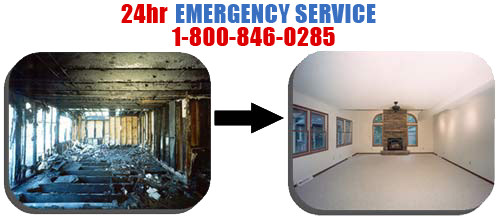When disaster strikes call the experts: Liberty Home Contractors, Inc.
Your Fire Department:
Your firefighters are highly trained specialists with these main prerequisites
when called to the scene.
* Above all, your firefighters have arrived to save lives.
* Firefighters must also protect themselves.
* After human safety is secured, they are able to proceed to put out the fire.
As firefighters, we need to perform certain procedures to make sure the blaze is out.
Here are some commonly asked questions about our operations:
Why break my windows, or cut holes in my roof and ceiling? A fire burns upward and then outward. Breaking windows and cutting holes in the roof and ceiling “vent” the fire. This action stops the outward movement of the fire. We are able to contain the fire and try to minimize damage.
Why did you cut holes in my walls? Fire has a tendency to travel between inside walls and partitions,. We want to make sure the fire is out the first time. To be absolutely sure, we must root out the fire in the surrounding walls and partitions.
Why did you leave fans or tarps? The fans were left to clear the smoke from the scene. The tarps will help secure the property. These items are the property of the fire department and must be returned.
YOUR INVESTIGATION TEAM
 All fire losses must be investigated by a professional inspection team. Your investigation team is made up of local fire investigators, the state fire marshal, and insurance company special cause-and-effect investigators. They are looking for the cause and origin of the blaze and must have your complete corporation. Most importantly, your inspection team must observe the scene as it happened, so please do not remove anything from the site until the investigation is complete, or you are told to do so. Any areas that are tapped-off are especially sensitive and must not be disturbed.
All fire losses must be investigated by a professional inspection team. Your investigation team is made up of local fire investigators, the state fire marshal, and insurance company special cause-and-effect investigators. They are looking for the cause and origin of the blaze and must have your complete corporation. Most importantly, your inspection team must observe the scene as it happened, so please do not remove anything from the site until the investigation is complete, or you are told to do so. Any areas that are tapped-off are especially sensitive and must not be disturbed.
Follow the instructions from your insurance representative, your firefighters, and the investigation team. Their experience and your cooperation can help you return to normal as quickly as possible.
YOUR INSURANCE COMPANY
You should call your insurance representative as soon as your safety is secured outside the fire scene. Most insurance companies in Ohio stipulate that the owner is obligated to protect the property from further damage after the fire is out. Your firefighters are not responsible for protecting your property after their job is complete. Remember, your firefighters are there to save lives and try to minimize the damage to your property and surrounding properties.
Your insurance representative can advise you on the following steps to take:
You must secure the structure before you leave the scene. Make sure first floor windows are boarded up, locks are secured on the doors and windows, and your utilities are turned off.
In the winter, drain your water to prevent frozen pipes and put antifreeze in the toilets.
Holes in the roof should be covered with tarps.
Do not remove any items from the fire scene until your insurance representative and the fire inspectors give their permission. Your claim must be inspected at the site to satisfy a proper damage report.
If you choose to employ a contractor to secure your property immediately after the fire, do not commit to the contractor for further repairs at that time. You are not obligated to the contractor beyond the board-up.
Do not use food items or canned goods that have been exposed to excessive heat.
Do not use television sets, stereos, or electrical appliances until they have been cleaned and checked by a serviceman.
If your home is not tenantable, be sure you remove your pets to a clean environment.
Do not turn on ceiling fixtures if the ceiling is wet.
Create a personal inventory list. Your adjuster will advise you on the types of items that should be detailed.
Do not enter a room if the ceiling is sagging.
Make sure your locks are in good working order.
ADDITIONAL LIVING EXPENSES
When you loose the use of your residence due to a fire, you may be entitled to benefits known as Additional Living Expenses, or A.L.E. Your insurance representative will advise you on your A.L.E. allotment. Basically, this kind of coverage is designed to pay for the homeowner’s expenses while he is unable to occupy his residence. The coverage only allows for expenses of “like kind and quality” – those expenses that maintain your present standard of living.
A.L.E.’s cover hotels or motels, food, laundry service, phones, gas mileage and travel time if your temporary residence puts you at a disadvantage to your workplace. Remember to keep all your receipts for proper and streamlined reimbursements.
YOUR REBUILDING CONTRACTOR
Do not sign an agreement with a rebuilding contractor at the time of your fire. Your first priorities are to secure your property, and make temporary living arrangements. Your adjuster may be able to make some initial contractor recommendations, but you are responsible for making the final decision.
Check your contractor’s credentials before you sign an agreement. The right contractor should be experienced in your town and have a solid rapport with your local building department – so call them first. Ask the contractor for credit references, a list of suppliers, and talk to other insurance companies in your area. And, do not hesitate to ask the contractor for names of clients who required similar services.
Ask your contractor how much of the work will be subcontracted, and how will subcontracting affect project control and your reoccupation date? A reliable contractor will be able to guarantee your a reoccupation date in writing.
Returning to normal after a fire is never easy. Keep in mind that help is available to you. Do not make hasty or costly decisions concerning your property under pressure. Follow instructions from your firefighters and investigators and cooperate with your adjuster. Seek the right contractor to rebuild your property. Choose the rebuilder that gives you straight-forward answers, proof of quality and professionalism – and return to normal with peace of mind.







